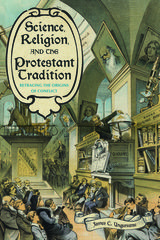148 scholarly books by Karolinum Press and 10
have author last names that start with V
148 scholarly books by Karolinum Press and 10
148 scholarly books by Karolinum Press
10 have author last names that start with V have author last names that start with V
10 have author last names that start with V have author last names that start with V

A Czech Dreambook
Ludvík Vaculík
Karolinum Press, 2018
It’s 1979 in Communist Czechoslovakia, ten years into the crushing period known as normalization, and Ludvík Vaculík has writer’s block. It has been nearly a decade since he wrote his powerful novel, The Guinea Pigs, and it was in 1968 that he wrote his anti-regime manifesto, Two Thousand Words, which the Soviet Union used as a pretext for invading Czechoslovakia. On the advice of his friend, the poet and surrealist painter Jiří Kolář, Vaculík begins to keep a diary, “a book about things, people, and events.” This marks the beginning of A Czech Dreambook.
Fifty-four weeks later, what Vaculík turns out to have written is a unique mixture of diary, dream journal, and outright fiction—an inverted roman à clef in which the author, his family, his mistresses, and the real leaders of the Czech underground play major roles. Undisputedly the most debated novel among the Prague dissident community of the 1980s, it is a work that Vaculík himself described as an amalgam of “hard-boiled documentary” and “magic fiction,” while Václav Havel called it “a truly profound and perceptive account. . . . A great novel about modern life and the crisis of contemporary humanity.”
A Czech Dreambook has been hailed as the most important work of Czech literature in the past forty years. And yet it has never before been available in English. Flawlessly translated by Gerald Turner, Vaculík’s masterpiece is a brilliant exercise in style, dry humor, and irony—an important portrait of the lives and longings of the dissidents and post-Communist elites.
Fifty-four weeks later, what Vaculík turns out to have written is a unique mixture of diary, dream journal, and outright fiction—an inverted roman à clef in which the author, his family, his mistresses, and the real leaders of the Czech underground play major roles. Undisputedly the most debated novel among the Prague dissident community of the 1980s, it is a work that Vaculík himself described as an amalgam of “hard-boiled documentary” and “magic fiction,” while Václav Havel called it “a truly profound and perceptive account. . . . A great novel about modern life and the crisis of contemporary humanity.”
A Czech Dreambook has been hailed as the most important work of Czech literature in the past forty years. And yet it has never before been available in English. Flawlessly translated by Gerald Turner, Vaculík’s masterpiece is a brilliant exercise in style, dry humor, and irony—an important portrait of the lives and longings of the dissidents and post-Communist elites.
[more]
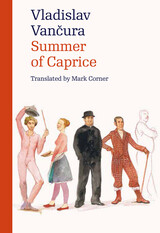
Summer of Caprice
Vladislav Vancura
Karolinum Press, 2016
Summer of Caprice, a captivating comic novel first published in 1926, is a classic of Czech literature, yet it is little known elsewhere. Commonly considered untranslatable due to the complexities of the text, which is characterized by a playful narrative and an exceptional mastery of language, and its profound cultural context, it is rendered here in English that beautifully captures Vladislav Vančura’s experimental style—or, as the author himself called it, his “poetism in prose.” Mixing the archaic with the innovative, raw colloquialisms with biblical quotations, Summer of Caprice opens an uproarious window onto the Czech spirit, humor, and way of life.
[more]
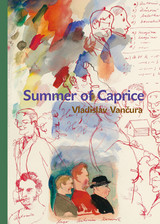
Summer of Caprice
Vladislav Vancura
Karolinum Press, 2006
Summer of Caprice, a captivating comic novel first published in 1926, is a classic of Czech literature, yet it is little known elsewhere. Commonly considered untranslatable due to the complexities of the text, which is characterized by a playful narrative and an exceptional mastery of language, and its profound cultural context, it is rendered here in English that beautifully captures Vladislav Vančura’s experimental style—or, as the author himself called it, his “poetism in prose.” Mixing the archaic with the innovative, raw colloquialisms with biblical quotations, Summer of Caprice opens an uproarious window onto the Czech spirit, humor, and way of life.
[more]

Ploughshares into Swords
Vladislav Vancura
Karolinum Press, 2021
The first English-language translation of a classic Czech antiwar novel written in the wake of WWI.
Originally published in 1925, Ploughshares into Swords is an expressionist antiwar novel in which Vladislav Vančura tells the story of the denizens of the Ouhrov estate in language as baroque as the manor that ties them all together. The fragmented narrative introduces the reader to such characters as Baron Danowitz, his sons, his French concubine, the farmhand František Hora, and the mentally disabled murderer Řeka in the autumn of 1913, before revealing their fates during World War I. Ranging from the peaceful farmlands of Bohemia to the battlefields of Galicia, taking in the pubs of Budapest and the hospitals of Krakow, the novel constitutes an unsentimental and naturalistic approach to the war that created Czechoslovakia. Ploughshares into Swords is a stunning novel by one of Czech literature’s most important writers. This modernist masterpiece, reminiscent of the work of Isaac Babel and William Faulkner, is now available in English for the very first time.
Originally published in 1925, Ploughshares into Swords is an expressionist antiwar novel in which Vladislav Vančura tells the story of the denizens of the Ouhrov estate in language as baroque as the manor that ties them all together. The fragmented narrative introduces the reader to such characters as Baron Danowitz, his sons, his French concubine, the farmhand František Hora, and the mentally disabled murderer Řeka in the autumn of 1913, before revealing their fates during World War I. Ranging from the peaceful farmlands of Bohemia to the battlefields of Galicia, taking in the pubs of Budapest and the hospitals of Krakow, the novel constitutes an unsentimental and naturalistic approach to the war that created Czechoslovakia. Ploughshares into Swords is a stunning novel by one of Czech literature’s most important writers. This modernist masterpiece, reminiscent of the work of Isaac Babel and William Faulkner, is now available in English for the very first time.
[more]

Around the Globe
Rethinking Oral History with Its Protagonists
Miroslav Vanek
Karolinum Press, 2013
In this unusual and important new work, Miroslav Vanek interviews twelve experts on oral history to discuss the medium’s current status within the social sciences in light of recent technology breakthroughs. Around the Globe addresses many of the challenges of oral history, from its inherent subjectivity to whether it should be treated as a discipline or simply a method for research. The interviewees also include their own accounts of how they began to study oral history, giving each section of the book a personal element that makes it a unique handbook for anyone using oral history in their research.
[more]

The Avant-Postman
Experiment in Anglophone and Francophone Fiction in the Wake of James Joyce
David Vichnar
Karolinum Press, 2022
A new look at the development of innovative postwar writing in France, Britain, and the United States.
The Avant-Postman explores a broad range of innovative postwar writing from France, Britain, and the United States. Taking James Joyce’s Ulysses and Finnegans Wake as a joint starting point, David Vichnar draws genealogical lines from there through the work of more than fifty writers up to very recent years, including William Burroughs, B. S. Johnson, Ian Sinclair, Kathy Acker, Alan Moore, David Foster Wallace, and many others. Centering the exploration around five strategies employed by Joyce—narrative parallax, stylistic metempsychosis, concrete writing, forgery, and neologizing the logos—the book reveals the striking continuities and developments from Joyce’s day to our own.
The Avant-Postman explores a broad range of innovative postwar writing from France, Britain, and the United States. Taking James Joyce’s Ulysses and Finnegans Wake as a joint starting point, David Vichnar draws genealogical lines from there through the work of more than fifty writers up to very recent years, including William Burroughs, B. S. Johnson, Ian Sinclair, Kathy Acker, Alan Moore, David Foster Wallace, and many others. Centering the exploration around five strategies employed by Joyce—narrative parallax, stylistic metempsychosis, concrete writing, forgery, and neologizing the logos—the book reveals the striking continuities and developments from Joyce’s day to our own.
[more]
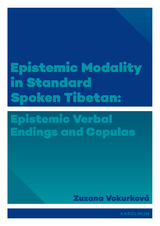
Epistemic Modality in Standard Spoken Tibetan
Epistemic Verbal Endings and Copulas
Zuzana Vokurková
Karolinum Press, 2017
The Sino-Tibetan language family is the second largest in the world, and standard Tibetan is the most widely spoken language in the Tibetic group. A comprehensive introduction to epistemicity in standard spoken Tibetan, this book examines the grammatical expression of a variety of epistemic modalities—rather, the myriad ways in which a speaker indicates their confidence in the knowledge on which their statement is based—through numerous examples of epistemic types. It elucidates the complex system of epistemic verbal endings and epistemic copulas, or connecting words, employed in the spoken language, analyzing them from semantic, syntactic, and pragmatic viewpoints.
[more]
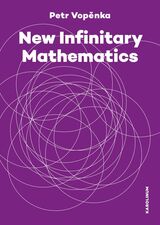
New Infinitary Mathematics
Petr Vopenka
Karolinum Press, 2023
A rethinking of Cantor and infinitary mathematics by the creator of Vopěnka's principle.
The dominant current of twentieth-century mathematics relies on Georg Cantor’s classical theory of infinite sets, which in turn relies on the assumption of the existence of the set of all natural numbers, the only justification for which—a theological justification—is usually concealed and pushed into the background.
This book surveys the theological background, emergence, and development of classical set theory, warning us about the dangers implicit in the construction of set theory, and presents an argument about the absurdity of the assumption of the existence of the set of all natural numbers. It instead proposes and develops a new infinitary mathematics driven by a cautious effort to transcend the horizon bounding the ancient geometric world and mathematics prior to set theory, while allowing mathematics to correspond more closely to the real world surrounding us. Finally, it discusses real numbers and demonstrates how, within a new infinitary mathematics, calculus can be rehabilitated in its original form employing infinitesimals.
The dominant current of twentieth-century mathematics relies on Georg Cantor’s classical theory of infinite sets, which in turn relies on the assumption of the existence of the set of all natural numbers, the only justification for which—a theological justification—is usually concealed and pushed into the background.
This book surveys the theological background, emergence, and development of classical set theory, warning us about the dangers implicit in the construction of set theory, and presents an argument about the absurdity of the assumption of the existence of the set of all natural numbers. It instead proposes and develops a new infinitary mathematics driven by a cautious effort to transcend the horizon bounding the ancient geometric world and mathematics prior to set theory, while allowing mathematics to correspond more closely to the real world surrounding us. Finally, it discusses real numbers and demonstrates how, within a new infinitary mathematics, calculus can be rehabilitated in its original form employing infinitesimals.
[more]
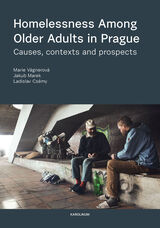
Homelessness among Older Adults in Prague
Causes, Contexts and Prospects
Marie Vágnerová
Karolinum Press, 2020
Following their engaging study Homelessness among Young People in Prague, the authors of this book turn their attention to an older population facing the same issue, a very different situation since these older adults grew up under a communist regime where an obligation to work was enshrined in law and living on the street could result in a prison sentence. Based on three years of research, this book provides a slew of data-based statistical insights, analyzing the efficacy of relief provided by both the state and nonprofit organizations, detailing how the clients of such organizations rate their services, to what extent they accept assistance, and whether they believe it has helped them. More importantly, it features extensive interviews with real people, making it the first Czech book on this issue to present homelessness from the perspective of those who live with it every day.
[more]
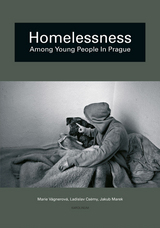
Homelessness among Young People in Prague
Marie Vágnerová
Karolinum Press, 2014
The chronically homeless face a stark reality: lack of access to support systems, adequate shelter, and sustenance, with little hope for something better. For young people, however, life on the street may be merely a temporary stage in their lives. This book tells of homelessness among young people—the causes and their attitudes to the various problems they face.
Young homeless people describe a life in which they lose their privacy, the possibility to satisfy their basic needs, and, often, their self-respect in order to survive. The latter half of the book considers what happens when these young people return to society and how they navigate difficulties as they attempt to leave their past behind. Often, the struggle is not solely one of coping with the stigma of their experience; rather, they must face the legacies that linger long after their lives have turned a corner: drug addiction, criminal records, and accumulated debt.
Based on interviews with homeless people in Prague, Homelessness as an Alternative Existence of Young People paints an authentic picture of this social group and documents the often unseen social consequences of the transformation to capitalism from communism.
Young homeless people describe a life in which they lose their privacy, the possibility to satisfy their basic needs, and, often, their self-respect in order to survive. The latter half of the book considers what happens when these young people return to society and how they navigate difficulties as they attempt to leave their past behind. Often, the struggle is not solely one of coping with the stigma of their experience; rather, they must face the legacies that linger long after their lives have turned a corner: drug addiction, criminal records, and accumulated debt.
Based on interviews with homeless people in Prague, Homelessness as an Alternative Existence of Young People paints an authentic picture of this social group and documents the often unseen social consequences of the transformation to capitalism from communism.
[more]
READERS
Browse our collection.
PUBLISHERS
See BiblioVault's publisher services.
STUDENT SERVICES
Files for college accessibility offices.
UChicago Accessibility Resources
home | accessibility | search | about | contact us
BiblioVault ® 2001 - 2024
The University of Chicago Press


